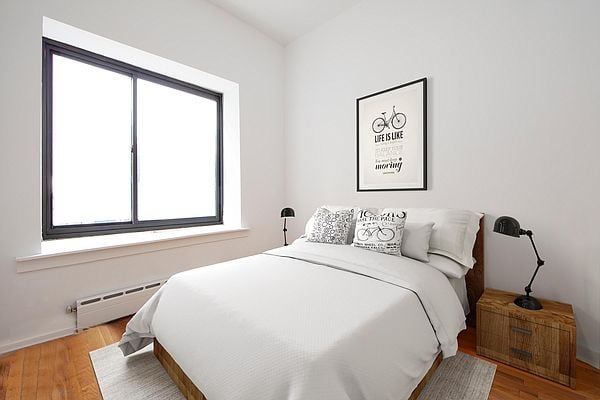How to find an NYC apartment when you don't live here

Yes, you can find an NYC apartment from far away.
iStock/rarrarorro
It’s hard enough to search for a place to live in New York City when you actually live here. Now think about this: trying to find an apartment when you don’t. But, due to a quick job relocation or change, time or money constraints, some people find themselves dealing with the task of finding a New York City apartment to rent or buy from out of state, or even the country. Challenging, yes—but not impossible, as evidenced by the experience of these real estate professionals.
Here are key tips and strategies for finding a New York City apartment when you don’t actually live here yet, as well as stories of people who have done it.
Identify your needs
It’s good advice for any person looking for a place to live, but giving some serious thought to what you need and want in a place to live—the apartment, building, neighborhood—is a key starting point for out-of-towners on the real estate hunt. You don’t need to know the city to know what’s important to you.
“Identify lifestyle choices or curate your New York experience,” says Victoria Vinokur, an agent at Halstead. “Is having a good coffee shop or a ‘neighborhood place’ to get a drink next door more important than a gym or a hair salon? Are you walking distance or a subway ride away to where you’d like to spend most of your time in the city? How important is that?”
“Figure out what you can compromise on, and what you can’t live without. Put together a ‘must-have’ vs. ‘would-be-nice-to-have’ vs. ‘OK, I can really live without’ list,” says Aleksandra Scepanovic, managing director of Ideal Properties Group. “Analyze your lifestyle as honestly as you can stand to. Think: washer/dryer, bocce court, saltwater swimming pool, spare visitor/study room, parking, radiant heating, helipad. Which are the ones that matter most?”
Enlist a broker
Knowing exactly what you like and what you don’t will go a long way, especially if you enlist a broker in your search. (Not suprisingly, the brokers we spoke to highly recommend working with one. However, if you aren’t physically here and/or don’t know the city, having a broker on your side can be a huge help.) Ideally, you should do this from afar, to kickstart your search and lay the groundwork. “Making a relationship ahead of time can be the best tool in your arsenal,” says Molly Franklin, an agent at Citi Habitats, who notes that “the climate of a neighborhood can change in two blocks,” something an NYC newbie would never know (or waste a lot of time figuring out).
If you do work with a broker, they will likely perform their own due diligence with you, asking you about every lifestyle preference you have (space, light, commuting length, etc., etc.) in order to zero in on the apartments best for you.
A broker can also help you understand the unique, often perplexing world of New York City real estate. “As an NYC broker, the bulk of my buyer clients do not already live here – they come from Dubai, Israel, and Europe – as well as Philadelphia, Florida, California and more,” says Dolly Hertz, associate broker with Engels & Volkers NYC. “There are of course numerous websites out-of-towners may be familiar with, but a word of caution: NYC and the condo/co-op/ rental market here is a phenomenon unto itself and completely unlike acquiring a house in Peoria, New Orleans or Alexandria. All apartments come with regulations and fees which vary greatly between co-ops, condos and rentals.”
Get your paperwork and finances in order
Do yourself a favor and obtain all the necessary documentation (and cash) you’ll need to seal a deal, whether you’re buying or renting. (Citi Habitats has this handy guide for renters.)
“For international renters, if you don’t have a credit history in the U.S., it can be much more difficult to get an apartment,” says Franklin. “You might have to be prepared to put down a year of rent.”
Don't have that much liquid? One option is to have someone (a parent, your company, etc.) act as a guarantor. If that's not possible, enlisting the services of an institutional guarantor could be the way to go. "Getting an apartment in NYC is extremely difficult for international renters, students, and recent graduates," says Jeffrey L. Geller, vice chairman and chief operating officer of Insurent Agency Corporation, a New York-based guarantor service (and Brick Underground sponsor).
"Landlords typically require an annual income of a minimum of 40 times the monthly rent and good US credit. Although international employed renters might meet the income requirement, they have no US credit, thus requiring them to put up significant additional security and/or prepayment of the full year’s rent. International students have no income and no US credit, and their parents abroad don’t count as individual guarantors."
How much will that cost you? The guaranty fee for US renters approximates 70% - 100% of one month's rent, and international students is 98.4% of one month's for the 12-14 month lease. Guaranty fees for foreign employed-persons and foreign persons with significant cash assets/marketable securities are approximately 95% to 110% of one month's for the 12-14 month lease. The good news is that prequalification occurs within 30 minutes and the guaranty is normally issued within 24 hours.
Additionally, you should have funds ready to go in a bank account, and be able to get a certified check from that account at a moment’s notice. Franklin notes that online banks—ones without brick and mortar locations—can take two days to cut a check, and in NYC real estate, that just won’t cut it. “It often comes down to who can put money down first.”
Low-tech strategies
One of the best things a prospective New Yorker can do is to drop-in, even if it’s for a day or two, and see apartments and neighborhoods in person.
“Being able to spend a few days and walking the city can be very helpful,” says Franklin.
A quick visit is a scenario in which working with a broker can up the efficiency and effectiveness of your search considerably, through pre-screening and NYC logistical prowess. “I have either seen or have previewed all of the properties in advance of such condensed visits,” says Vinokur.
“If you can come to New York for a day or two, I arrange a half-day or full-day showing tour of up to 20 properties. With a chauffeured car waiting outside, no travel time is wasted, and we can really cover the city,” says Hertz.
High-tech help
Technology has certainly changed the game of looking for and at real estate. Enlisting high res photos, video tours, walkthroughs via FaceTime or WhatsApp is very common now. Of course, this can be done with, or without, an agent—you’ll just need to have a helpful partner/friend/relative to tour apartments for you if you’re not working with a broker.
CORE agent John Harrison, who has helped people from as far away as California and Singapore find apartments to both rent and buy, thinks that an overall comfort with buying things sight unseen (read: Amazon), and the increased overall transparency that technology provides (via online search, phone photo and video documentation) are factors contributing to the trend. (He himself bought an investment property in Texas without seeing it in person.) "It's not as mysterious a process as it once may have been," he says.
Often, people begin their search via digital means, and do the serious business in person. “I had a situation a few years ago when I was representing a seller in Riverdale and the broker, whose client lived in LA, came to the apartment and FaceTimed the place,” says Brown Harris Stevens’ Andrew Kramer. “A few days later the buyer flew in and made an offer.”
But that’s not always the case, such as when an apartment is more of an investment than a personal home. “I sold an apartment at 21 E61 The Carlton House last year to a buyer in Moscow. We did the entire deal via FaceTime/WhatsApp,” says Brown Harris Stevens Cathy Angert. “He only visited the apartment one year after the closing. The tenant in place gave us permission to enter.” “I have worked with several renters via FaceTime to show rentals and have moved clients from London, Germany, and Switzerland to NYC. Often the strategy is the same: phone conversation, Dropbox for documents, FaceTime showings, and same for the interview, if needed,” says Leigh Wallace of Brown Harris Stevens, who did her first deal this way in the summer of 2015. “The couple who owned the building were 89 and 92. They had lived in the neighborhood and owned the building for 50 years and were more fluent in Italian than English.”
“I showed the apartment to a renter moving from London via Skype. She moved forward with the apartment to take a job at the Guggenheim, sent the documents, and wired the funds. The owners wanted to interview her. When I showed up to their first floor apartment with an iPad so they could speak to the potential renter and her daughter, they looked at each other in awe. They spoke to their future tenants on this tiny iPad and loved it. Still one of the greatest moments of my early real estate career.”



























